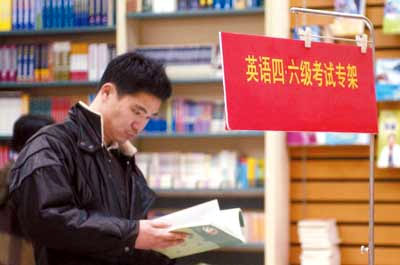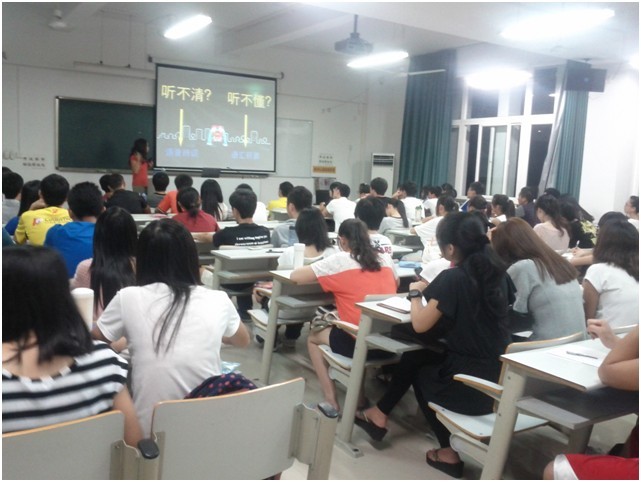 返回
教育头条
返回
教育头条

英语四级阅读真题答案及解析 四六级报名
英语四级阅读真题答案及解析(仔细阅读)预祝大家高分通过大学英语四级考试! 2019年6月大汇总 题型
答案:BCDDC If you were like most children, you probably got upset when your mother called you by a sibling’s(兄弟姐妹的)name. How could she not know you? Did it mean she loved you less?
Probably not. According to the first research to tackle this topic head-on, misnaming the most familiar people in our life is a common cognitive (认知的)error that has to do with how our memories classify and store familiar names. The study, published online in April in the journal Memory and Cognition,found that the “wrong” name is not random but is invariably fished out from the same relationship pond: children, siblings, friends. The study did not examine the possibility of deep psychological significance to the mistake, says psychologist David Rubin, “but it does tell us who’s in and who’s out of the group.” The study also found that within that group, misnamings occurred where the names shared initial or internal sounds, like Jimmy and Joanie or John and Bob. Physical resemblance between people was not a factor. Nor was gender.
The researchers conducted five separate surveys of more than 1,700 people. Some of the surveys included only college students; others were done with a mixed-age population. Some asked subjects about incidents where someone close to them—family or friend—had called them by another person’s name. The other surveys asked about times when subjects had themselves called someone close to them by the wrong name. All the surveys found that people mixed up names within relationship groups such as grandchildren, friends and siblings but hardly ever crossed these boundaries.
In general, the study found that undergraduates were almost as likely as old people to make this mistake and men as likely as women. Older people and this mistake and men as likely as women. Older people and women made the mistake slightly more often, but that may be because grandparents have more grandchildren to mix up than parents have children. Also, mothers may call on their children more often than fathers, given traditional gender norms. There was no evidence that errors occurred more when the misnamer was frustrated, tired or angry.
51.How might people often feel when they were misnamed? A)Unwanted. B)Unhappy. C)Confused. D)Indifferent. 关键词:feel, when they were misnamed,定位到一、段:If you were like most children, you probably got upset when your mother called you by a sibling’s(兄弟姐妹的)name.文章中的upset和选项的unhappy同义替换。
52.What did David Rubin’s research find about misnaming? A)It is related to the way our memories work. B)It is a possible indicator of a faulty memory. C)It occurs mostly between kids and their friends. D)It often causes misunderstandings among people. 关键词:David Rubin, find, misnaming,定位到第三段之后。这个问题问的是研究结果,我们去文章中找study found that!!The study, found that the “wrong” name is not random but is invariably fished out from the same relationship pond: children, siblings, friends.
53. What is most likely the cause of misnaming? A) Similar personality traits. B) Similar spellings of names. C) Similar physical appearance. D) Similar pronunciation of names. 关键词:the cause of misnaming,定位到第四段。The study also found that within that group, misnamings occurred where the names shared initial or internal sounds, like Jimmy and Joanie or John and Bob. Physical resemblance between people was not a factor. Nor was gender. “shared initial or internal sounds”是“similar pronunciation”的同义替换。

54. What did the surveys of more than 1,700 subjects find about misnaming? A) It more often than not hurts relationships. B) It hardly occurs across gender boundaries. C) It is most frequently found in extended families. D) It most often occurs within a relationship groups. 关键词:surveys,1,700,find。问的是研究结果。定位到第五段。All the surveys found that people mixed up names within relationship groups such as grandchildren, friends and siblings but hardly ever crossed these boundaries.所有的调查都发现,人们在孙辈、朋友和兄弟姐妹等关系群体中会混淆名字,但几乎从未跨越这些界限。选D
55. Why do mothers misname their children more often than fathers? A) They suffer more frustrations. B) They become worn out more often. C) They communicate more with their children. D) They generally take on more work at home. 关键词:Why, mother, more often than fathers提问原因。Also, mothers may call on their children more often than fathers, given traditional gender norms. There was no evidence that errors occurred more when the misnamer was frustrated, tired or angry.通过后一句话可以排除A和B,call on是communicate的同义替换。
答案:BCDDC If you were like most children, you probably got upset when your mother called you by a sibling’s(兄弟姐妹的)name. How could she not know you? Did it mean she loved you less?
Probably not. According to the first research to tackle this topic head-on, misnaming the most familiar people in our life is a common cognitive (认知的)error that has to do with how our memories classify and store familiar names. The study, published online in April in the journal Memory and Cognition,found that the “wrong” name is not random but is invariably fished out from the same relationship pond: children, siblings, friends. The study did not examine the possibility of deep psychological significance to the mistake, says psychologist David Rubin, “but it does tell us who’s in and who’s out of the group.” The study also found that within that group, misnamings occurred where the names shared initial or internal sounds, like Jimmy and Joanie or John and Bob. Physical resemblance between people was not a factor. Nor was gender.
The researchers conducted five separate surveys of more than 1,700 people. Some of the surveys included only college students; others were done with a mixed-age population. Some asked subjects about incidents where someone close to them—family or friend—had called them by another person’s name. The other surveys asked about times when subjects had themselves called someone close to them by the wrong name. All the surveys found that people mixed up names within relationship groups such as grandchildren, friends and siblings but hardly ever crossed these boundaries.
In general, the study found that undergraduates were almost as likely as old people to make this mistake and men as likely as women. Older people and this mistake and men as likely as women. Older people and women made the mistake slightly more often, but that may be because grandparents have more grandchildren to mix up than parents have children. Also, mothers may call on their children more often than fathers, given traditional gender norms. There was no evidence that errors occurred more when the misnamer was frustrated, tired or angry.
51.How might people often feel when they were misnamed? A)Unwanted. B)Unhappy. C)Confused. D)Indifferent. 关键词:feel, when they were misnamed,定位到一、段:If you were like most children, you probably got upset when your mother called you by a sibling’s(兄弟姐妹的)name.文章中的upset和选项的unhappy同义替换。
52.What did David Rubin’s research find about misnaming? A)It is related to the way our memories work. B)It is a possible indicator of a faulty memory. C)It occurs mostly between kids and their friends. D)It often causes misunderstandings among people. 关键词:David Rubin, find, misnaming,定位到第三段之后。这个问题问的是研究结果,我们去文章中找study found that!!The study, found that the “wrong” name is not random but is invariably fished out from the same relationship pond: children, siblings, friends.
53. What is most likely the cause of misnaming? A) Similar personality traits. B) Similar spellings of names. C) Similar physical appearance. D) Similar pronunciation of names. 关键词:the cause of misnaming,定位到第四段。The study also found that within that group, misnamings occurred where the names shared initial or internal sounds, like Jimmy and Joanie or John and Bob. Physical resemblance between people was not a factor. Nor was gender. “shared initial or internal sounds”是“similar pronunciation”的同义替换。

54. What did the surveys of more than 1,700 subjects find about misnaming? A) It more often than not hurts relationships. B) It hardly occurs across gender boundaries. C) It is most frequently found in extended families. D) It most often occurs within a relationship groups. 关键词:surveys,1,700,find。问的是研究结果。定位到第五段。All the surveys found that people mixed up names within relationship groups such as grandchildren, friends and siblings but hardly ever crossed these boundaries.所有的调查都发现,人们在孙辈、朋友和兄弟姐妹等关系群体中会混淆名字,但几乎从未跨越这些界限。选D
55. Why do mothers misname their children more often than fathers? A) They suffer more frustrations. B) They become worn out more often. C) They communicate more with their children. D) They generally take on more work at home. 关键词:Why, mother, more often than fathers提问原因。Also, mothers may call on their children more often than fathers, given traditional gender norms. There was no evidence that errors occurred more when the misnamer was frustrated, tired or angry.通过后一句话可以排除A和B,call on是communicate的同义替换。
上述就是教育宝头条介绍的完整信息,想要查看更多的四级六级考试资讯,敬请关注我的微信18560125702,还可免费获取学习攻略哦!返回教育宝头条
【免责声明】本文仅代表作者本人观点,与教育宝无关。教育宝对文中陈述、观点判断保持中立,不对所包含内容的准确性、可靠性或完整性提供任何保证。请读者仅作参考,特此声明!





